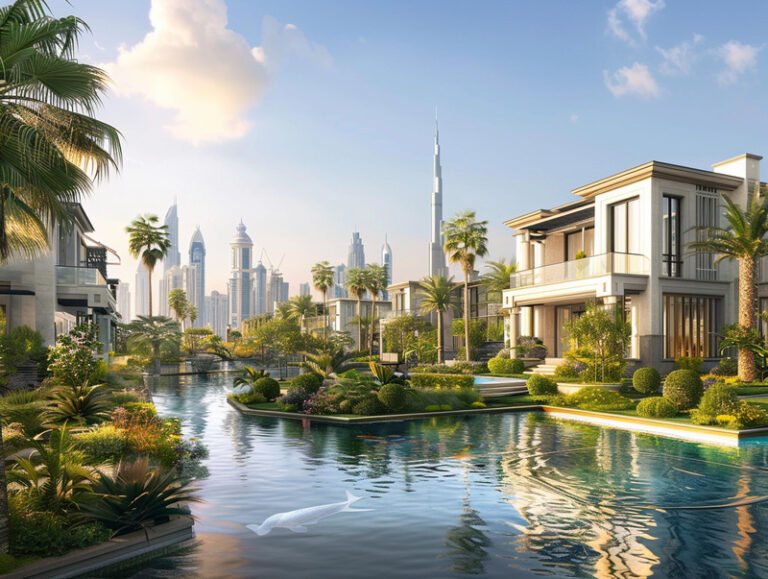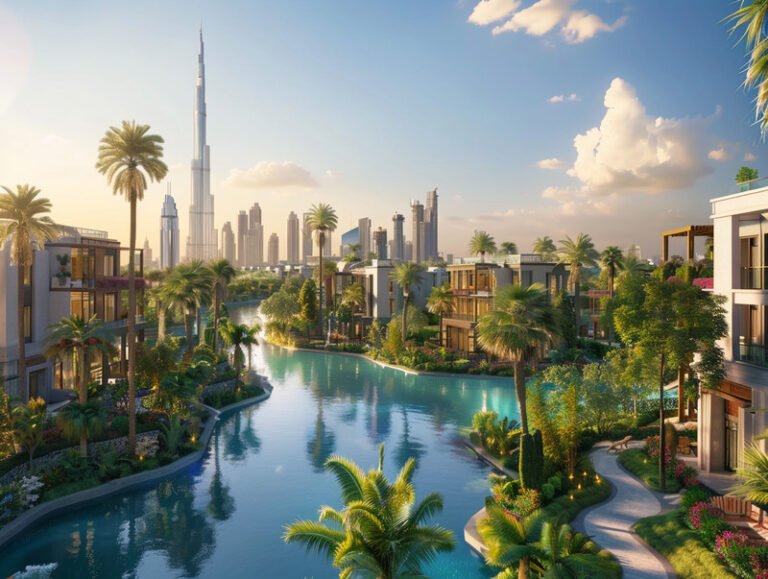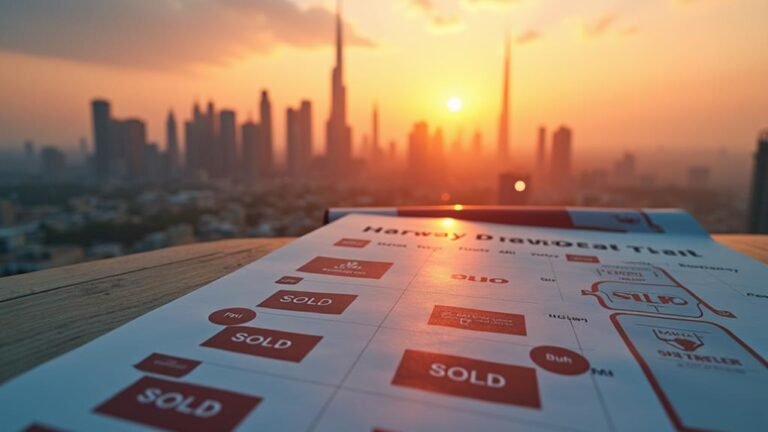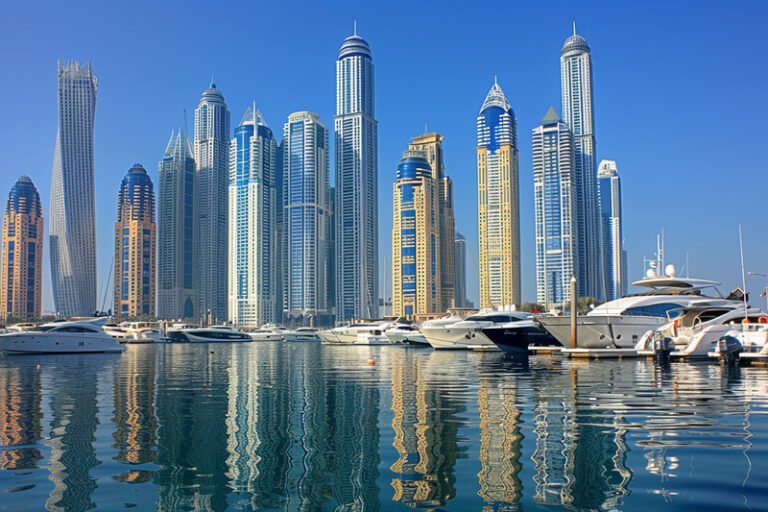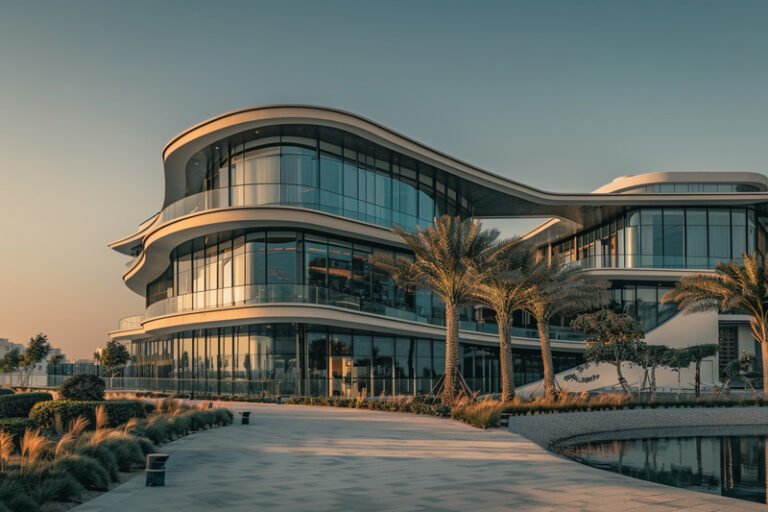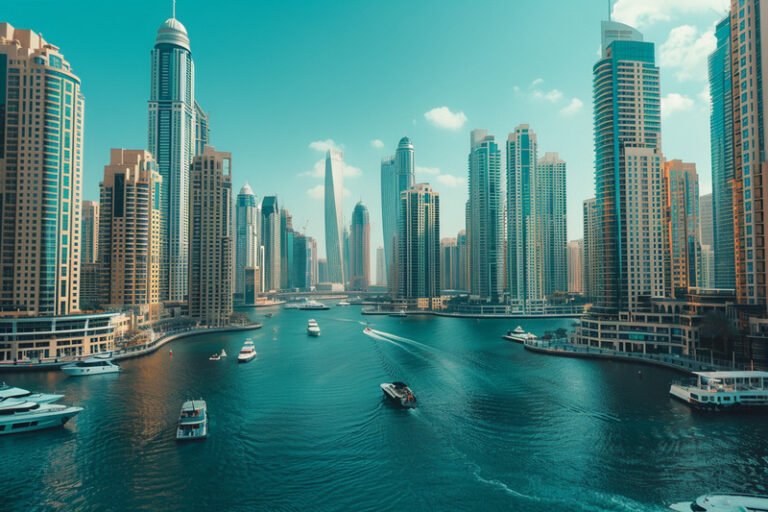What Is a Freehold Property in Dubai
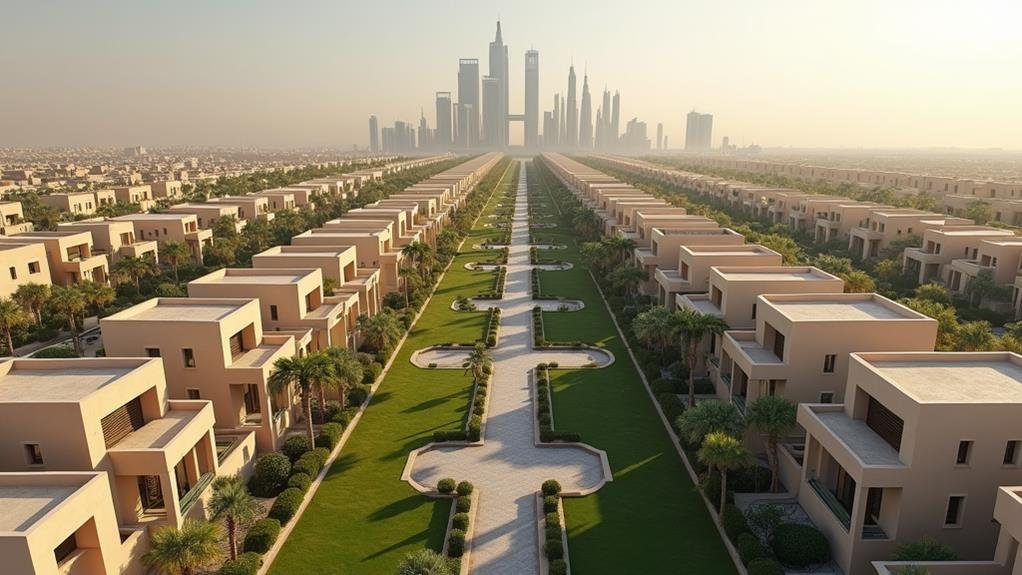
In Dubai, owning a freehold property grants you complete ownership of both the land and the property itself. This ownership is not bound by time limits, giving you the freedom to sell, lease, or develop your property as you wish.
Currently, over 60 designated areas in Dubai are available for foreign ownership. This makes freehold properties an attractive option for international buyers looking to invest in the Dubai real estate market.
As a freehold owner, you have the unrestricted right to modify your property. You'll also receive a title deed, which secures your rights and control over the property.
By understanding the specifics of freehold property in Dubai, you can appreciate its benefits. This knowledge will help you make informed decisions about your real estate investments in the city.
Let us help you find the perfect property. Contact us to get started.
Understanding Freehold Property Ownership
When you own a freehold property in Dubai, you have complete ownership of both the land and the property itself, giving you full control over your real estate assets. This type of ownership is registered with the Dubai Land Department (DLD), and you receive a title deed that establishes your rights and ownership.
As a freehold property owner, you're free to make modifications to the property without needing permission from external parties. In addition, the legal framework encourages foreign investment, allowing expatriates, including Indians, to own properties in designated areas without the need for a local partner, enhancing the attractiveness of the investment landscape for Indians looking to invest.
You also have the right to lease or sell your property as you see fit. Moreover, freehold ownership grants you inheritance rights, allowing you to pass down the property to your heirs according to your wishes, with or without a will.
As an expatriate, you can purchase freehold properties in designated areas, with over 60 freehold zones currently available in Dubai. It's important to understand the terms and conditions of freehold ownership to appreciate the benefits and responsibilities that come with it.
Freehold Vs Leasehold Properties
Now that you understand the concept of freehold property ownership in Dubai, let's compare it with leasehold properties to highlight their differences.
When you own a freehold property, you have complete ownership of both the property and the land it's on. This allows you to make modifications without needing external permission. In contrast, leasehold properties only provide ownership of the property for a specified period, typically up to 99 years, with the land owned by another party.
Freehold ownership is a popular choice among investors due to the eligibility criteria that facilitate easier transactions. As a freehold owner, you receive a title deed from the Dubai Land Department, ensuring full rights and control. You can also inherit, sell, or lease your property without restrictions.
Leasehold owners, on the other hand, must adhere to lease agreements and typically require the freeholder's approval for any alterations. Freehold properties are only available in designated areas, enhancing their investment potential.
While leasehold properties are more widely accessible, they often come with limited ownership control. Generally, freehold properties appreciate faster in value compared to leasehold properties, making them a more favorable long-term investment. Understanding these differences is essential when deciding which type of property to invest in.
Benefits of Freehold Ownership

Owning a freehold property in Dubai offers a distinct set of advantages. As a freehold property owner, you have complete control over the property and land, giving you the freedom to make modifications without needing external permission.
This autonomy allows you to tailor your property to your preferences and needs, and with the added benefit of investment trends indicating a steady growth in property values, your investment can yield considerable returns.
You're also entitled to a renewable UAE residence visa if your investment exceeds AED 1 million, enhancing your residency options.
In addition, freehold properties can be inherited, ensuring that ownership remains within your family and providing long-term security and stability.
When it comes to managing your investment, you have the freedom to sell or lease your property at your discretion, maximizing potential income and investment returns.
Historically, freehold properties in Dubai tend to appreciate in value more markedly than leasehold properties, offering better long-term capital gains.
Types of Freehold Properties
Delving into the world of freehold properties in Dubai reveals a diverse array of options, catering to varied lifestyle preferences and investment goals.
You'll find a range of residential options, including luxurious villas, stylish townhouses, and high-rise apartments. These cater to diverse lifestyle preferences, ensuring that you can find a property that suits your needs.
On the commercial side, freehold properties encompass office spaces, retail outlets, and warehouses. These provide investment opportunities in Dubai's thriving business environment.
If you're looking for a mix of both, mixed-use developments integrate residential and commercial spaces, allowing for a vibrant community lifestyle while maximizing investment potential.
With over 60 designated freehold areas in Dubai, you have a wide range of property types to choose from.
Popular areas like Downtown Dubai and Dubai Marina are notable developments that attract both local and international buyers. These areas offer a range of properties, from apartments to villas, and office spaces to retail outlets, providing you with a variety of options to suit your investment goals and lifestyle preferences.
Freehold Property in Dubai Explained

When considering investing in Dubai's property market, it's crucial to understand the concept of freehold property. As a potential buyer, you'll want to know that a freehold property in Dubai refers to complete ownership of both the land and the property. This means you'll have unrestricted rights to modify, lease, or sell without needing permission from a third party.
Freehold properties are registered with the Dubai Land Department (DLD) and come with a title deed, guaranteeing clear ownership rights and legal protection. As a foreigner, you're eligible to purchase freehold properties in designated areas of Dubai, which currently encompass over 60 neighborhoods, including popular locations like Downtown Dubai and Dubai Marina.
As a freehold property owner, you'll be entitled to renewable UAE residence visas for properties valued above AED 1 million, making it an attractive option for expatriates and investors.
Understanding the concept of freehold property in Dubai will help you make informed decisions when investing in the local market. By grasping the specifics of freehold ownership, you'll be better equipped to navigate the market and guarantee your investment goals are met. Your ownership rights will be secure and protected under Dubai's laws and regulations.
Growth of Freehold Market
The Dubai freehold market has witnessed considerable expansion over the years, driven by the proliferation of designated freehold areas, which now exceed 60 neighborhoods. As a result, you're seeing a surge in international investors seeking ownership opportunities in the emirate. Notable developments in sought-after locations like Downtown Dubai and Dubai Marina have contributed considerably to the rising demand for freehold properties.
You can now find a diverse range of property options catering to various budgets, from luxury villas to affordable apartments, which appeals to a broader audience. Stricter regulations and quality control measures introduced by the Dubai government have enhanced market transparency, fostering buyer confidence in freehold investments.
Looking ahead, the freehold market is predicted to sustain growth and stability, driven by increasing demand for eco-friendly and sustainable properties, as well as innovative co-living and co-working spaces. As the market continues to mature, you can expect to see more sophisticated and diverse offerings, making it an attractive option for investors and end-users alike.
With its continued growth, the Dubai freehold market remains a compelling choice for those seeking a secure and stable investment opportunity.
Regulatory Changes in Dubai

Several key regulatory changes have been implemented in Dubai's freehold market, transforming the way property transactions are conducted and safeguarding investor interests.
You'll notice that the Dubai Land Department (DLD) has played a significant role in enhancing transparency and protecting investor rights. Stricter regulations have been introduced to guarantee quality control in the freehold market, including guidelines for property developers and investor rights.
The DLD has also streamlined processes for property transactions, reducing paperwork and making it easier for you to acquire freehold properties as a foreign investor.
In addition, recent initiatives have focused on improving dispute resolution mechanisms for freehold ownership, allowing for quicker resolution of conflicts between owners and developers.
The government has also introduced investor protections and regulations aimed at preventing fraudulent practices in the real estate market, boosting buyer confidence.
These changes have created a more secure and transparent environment for you to invest in Dubai's freehold market.
Future of Freehold Properties
Fueling further growth in the Dubai freehold market is a convergence of factors, including a surge in foreign investment, increasing demand for permanent residency options tied to property ownership, and enhancements in market transparency.
As a result, you can expect the freehold property market in Dubai to experience sustained growth and stability. Emerging trends indicate a rising interest in niche segments, such as eco-friendly developments and co-living spaces, reflecting changing buyer preferences and lifestyle choices.
Regulatory enhancements and government initiatives will further boost market transparency and investor confidence, making freehold investments more attractive.
The integration of technology in property searches and transactions will enhance the user experience, simplifying the acquisition process for buyers.
Additionally, the continued development of new freehold areas in Dubai will diversify options available for investors, catering to various budgets and lifestyle needs.
As the market continues to evolve, you'll have access to a wider range of investment opportunities, making it easier to find a property that suits your needs.
With these factors in play, the future of freehold properties in Dubai looks promising.
Role of Real Estate Advisors

As you navigate the complexities of Dubai's freehold property market, working with a reputable real estate advisor becomes vital. They provide you with essential knowledge about the local property market, helping you navigate the complexities of freehold ownership.
Advisors assist you in identifying suitable freehold properties that align with your investment goals and lifestyle preferences. RERA-qualified agents guarantee compliance with legal regulations and safeguard your interests during transactions.
They offer insights into market trends, pricing, and potential returns on investment, enhancing your decision-making process. By working with a reputable advisor, you gain a deeper understanding of the market, enabling you to make informed decisions.
Many real estate firms, such as Rocky Real Estate, provide free consultations to facilitate informed property purchases in Dubai's competitive market. By leveraging their expertise, you can mitigate risks and capitalize on opportunities.
As you explore the freehold property market in Dubai, partnering with a reliable real estate advisor is vital for achieving your investment objectives.
Property Ownership in Dubai
When you've found the right freehold property in Dubai, often with the guidance of a reputable real estate advisor, understanding the ins and outs of property ownership becomes essential.
You'll need to grasp the concept of complete ownership, which includes both the property and the land it sits on. This means you'll have unrestricted rights to modify, sell, or lease your property without needing external permission.
As a foreign investor, you can purchase freehold properties in designated areas, which currently exceed 60 locations in Dubai. To secure your ownership, you'll need to register your property with the Dubai Land Department and obtain a title deed, ensuring legal recognition and property rights.
If your property is valued above AED 1 million, you'll also be entitled to a renewable UAE residence visa, a significant benefit for expatriates looking to invest.
Advantages of Freehold Properties

What makes freehold properties in Dubai an attractive option for investors? For starters, you'll have complete ownership of both the property and the land, giving you the freedom to modify, sell, or lease your assets without needing external permission.
You'll also be eligible for a renewable UAE residence visa if your property is valued above AED 1 million, making long-term residency a breeze.
Here are four key advantages of owning a freehold property in Dubai:
- Complete Ownership: You own the property and the land, with full control over modifications, sales, and leasing.
- Residency Options: Properties valued above AED 1 million come with renewable UAE residence visas, facilitating long-term residency.
- Inheritance Rights: Freehold properties can be passed down to heirs, providing a sense of security for families.
- Long-term Investment Potential: Freehold properties offer significant capital appreciation and rental income opportunities in Dubai's thriving real estate market.
With these benefits, it's no wonder investors are drawn to freehold properties in Dubai.
You'll have access to a diverse range of options, including residential, commercial, and mixed-use developments in designated areas of Dubai.
Important Considerations for Buyers
Investors drawn to the benefits of freehold properties in Dubai should also be aware of the key considerations that come with purchasing these assets. As a buyer, you'll want to conduct thorough due diligence on the developer's reputation and the property documents to avoid potential issues in the future.
It's also vital to explore various mortgage financing options from banks, as interest rates and terms can greatly impact overall investment costs. You'll need to take into account ongoing costs, such as maintenance fees and service charges, which can vary greatly based on the property type and location.
Hiring a property management company can be beneficial for overseeing leasing and maintenance, especially for absentee owners or those unfamiliar with local regulations. Additionally, engaging legal assistance is essential to guarantee compliance with UAE property laws and to facilitate a smooth purchase process, including understanding the implications of ownership on residency and visas.
Dubai Freehold Market Trends

Sixty-plus designated freehold areas are now available to foreign investors in Dubai, marking a significant expansion of the city's freehold property market. As you explore the market, you'll notice recent regulatory changes have enhanced transparency, boosting buyer confidence and encouraging international investment in Dubai's freehold sector.
This increased confidence is reflected in the consistent appreciation in value of freehold properties, making them an attractive long-term investment option.
Key trends shaping the Dubai freehold market include:
- Increasing demand for niche segments: Eco-friendly developments and co-living spaces are gaining popularity, reflecting changing consumer preferences.
- Rising adoption of technology: Property search processes are becoming more efficient, with technological advancements facilitating easier transactions.
- Growing international investment: Enhanced market transparency has sparked increased interest from foreign investors, driving market growth.
- Consistent appreciation in value: Freehold properties continue to show steady long-term growth, making them a secure investment option.
These trends indicate a maturing market, offering a range of opportunities for buyers and investors.
Frequently Asked Questions
What Is the Difference Between Freehold and Leasehold in Dubai?
When you buy property in Dubai, you'll encounter two ownership types: freehold, where you own the property and land outright, and leasehold, where you own the property for a set period, typically up to 99 years.
How Long Is Freehold Property in Dubai?
You own a freehold property in Dubai indefinitely, as there's no expiration date on ownership, but you'll still need to comply with local regulations and zoning laws that may affect your property's use and modifications.
Does Dubai Have Freehold Property?
You can indeed find freehold properties in Dubai, where you'll have full ownership of the property and land. Over 60 freehold areas exist, offering a range of options to suit your budget and lifestyle preferences.
What Will Happen After 99 Years of Leasehold in Dubai?
After 99 years of leasehold in Dubai, you'll lose ownership rights unless you negotiate a renewal with the freeholder before expiration. You should initiate discussions early to secure favorable terms and understand potential additional costs or conditions.
Conclusion
You've gained a thorough understanding of freehold property in Dubai. As a freehold property owner, you'll have absolute ownership and control over your property. With the Dubai government allowing foreigners to own freehold properties in designated areas, you can capitalize on this opportunity. Be aware of the market trends, regulations, and associated costs to make an informed decision. Ultimately, freehold ownership offers long-term benefits and a sense of security, making it an attractive option in Dubai's real estate market.
Let us help you find the perfect property. Contact us to get started.

